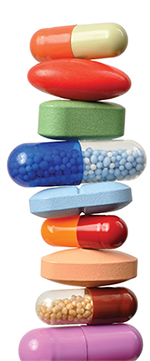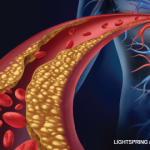
ajt/shutterstock.com
FDA to Review Abuse-Deterrent Oxycodone Capsule
In June, the FDA will discuss the New Drug Application for Remoxy ER at an Advisory Committee meeting. Remoxy ER is a 12-hour, abuse-deterrent, extended-release oxycodone in a capsule formulation.1 The capsule contains a sticky, thick, high-viscosity formulation to deter unapproved drug administration routes, including injection, smoking or snorting.
The Prescription Drug User Fee Act target date for the Remoxy ER New Drug Application is Aug. 7.
Why Patients Exceed Recommendations for Ibuprofen & NSAIDs
Non-steroidal anti-inflammatory drugs (NSAIDs) are commonly used and effective pain relievers, but they are not without risk. In the U.S., the NSAIDs ibuprofen, naproxen and aspirin are available over the counter (OTC), with the former two agents also available via prescription. In a recent study, David W. Kaufman, ScD, Slone Epidemiology Center at Boston University, and colleagues determined the prevalence of patients exceeding the daily dosing limit of NSAIDs and identified characteristics of dose-exceeding patients.2
Exceeding the daily dosing limit often resulted from taking too much of a single NSAID at once, taking different NSAIDs at the same time or failing to wait long enough before taking another dose. Experience has shown that patients often know the names of the products, but do not realize the treatments are part of the same family or have the same mechanism of action. Patients also don’t realize they should not take ibuprofen and naproxen together, or think acetaminophen is in the same class as ibuprofen, an NSAID. Additionally, combination products with NSAIDs may prevent patients from realizing they are taking a prescription combination product of an NSAID and an OTC product together. Basically, some patients are double dosing and increasing their risk of harm.
The research: In the study, conducted from May 2015 through March 2016, patients had to have used an ibuprofen-containing product in the preceding 30 days. Participants were not informed the study was about NSAIDs. More than 207,000 invitations were sent out, and 4,161 people were eligible for the study based on their ibuprofen use. In total, 1,745 adults completed the seven-consecutive day online diary and the exit questionnaire, which obtained demographic information, medical history, physical and mental health status, attitudes regarding label reading and dosing behavior, and knowledge of product label instructions. Of these participants, 1,326 reported the use of ibuprofen at least once, and data from these 1,326 participants were analyzed.
Only 39% of the subjects recognized that all of the products they were taking were NSAIDs. Ninety percent of the diary users took OTC ibuprofen during the week; 37% also took non-ibuprofen NSAIDs. For ibuprofen use, 11% of users exceeded the daily dosing limit. Additionally, 4% of users of other NSAIDs exceeded the daily dosing limit. This excess occurred on 9.1% of NSAID usage days. Also, the daily limit for naproxen was exceeded by 23% of naproxen users, a higher prevalence than for ibuprofen.
Exceeding the daily dosing limit was associated with exceeding the one-time dose, particularly for individuals with one-tablet doses vs. two-tablet doses. Participant characteristics associated with exceeding the daily dosing limit were being male, having chronic or other ongoing pain, having poor physical function, having a high school level education and being a daily smoker. Additionally, these participants had the attitude of “choosing my own dose,” did not start with the lowest recommended dose and had poor knowledge of the recommended one-time and 24-hour doses. Users were more likely to exceed the one-dose medication amount if they were in severe pain.
The authors found that a mindset of “NSAID users can choose their own dose” irrespective of dosing recommendations and poor knowledge of maximum one-time and 24-hour dosing was associated with exceeding the daily dosing limit. Starting with the lowest effective dose was inversely associated with exceeding the daily dosing limit. Additionally, these characteristics are potentially modifiable.
One major limitation was the study’s low participation rate.
Adalimumab Biosimilar Coming to Market
On April 5, Samsung Bioepis Co. Ltd. announced it had settled all pending patent litigation with AbbVie Inc. over SB5 (Imraldi). Imraldi is biosimilar to AbbVie Inc.’s adalimumab (Humira). Imraldi is expected to be available in Europe in October 2018. If the agent receives FDA approval, it will be available in the U.S. in June 2023.3
FDA Approves Tildrakizumab-asmn for Plaque Psoriasis
Tildrakizumab-asmn (Ilumya) has received FDA approval to treat adults with moderate to severe plaque psoriasis who are candidates for systemic therapy or phototherapy.4 The treatment selectively binds to the p19 subunit of interleukin (IL) 23 and inhibits its interaction with the IL-23 receptor, which inhibits the release of proinflammatory cytokines and chemokines. The treatment is administered as 100 mg subcutaneous injections at Weeks 0 and 4, and every 12 weeks thereafter.
This approval was supported by data from two Phase 3, multi-center, randomized, double-blind, placebo-controlled trials: reSURFACE 1 and reSURFACE 2. The trials included 926 adults treated with either tildrakizumab-asmn (n=616) or placebo (n=310). The primary efficacy endpoints were achieving a Psoriasis Area Sensitivity Index (PASI75) and a Physician’s Global Assessment score of clear or minimal at Week 12, after receiving two doses. Both studies met the primary efficacy endpoints, demonstrating significant clinical improvement with the active drug compared with placebo.
Michele B. Kaufman, PharmD, BCGP, is a freelance medical writer based in New York City and a pharmacist at New York Presbyterian Lower Manhattan Hospital.
References
- Pain Therapeutics Inc. News release: Pain Therapeutics announces FDA advisory committee meeting for Remoxy ER. FirstWord Pharma. 2018 Mar 19.
- Kaufman DW, Kelly JP, Battista DR, et al. Exceeding the daily dosing limit of nonsteroidal anti-inflammatory drugs among ibuprofen users. Pharmacoepidemiol Drug Saf. 2018 Mar;27(3):322–331.
- Samsung Bioepis. News release: Samsung Bioepis settles patent disputes with AbbVie, clearing the way for the commercialization of SB5 (adalimumab) in all approved markets worldwide. 2018 Apr 5.
- Sun Pharma. News release: Sun Pharma announces U.S. FDA approval of Ilumya (tildrakizumab-asmn) for the treatment of moderate to severe plaque psoriasis. 2018 Mar 21.



